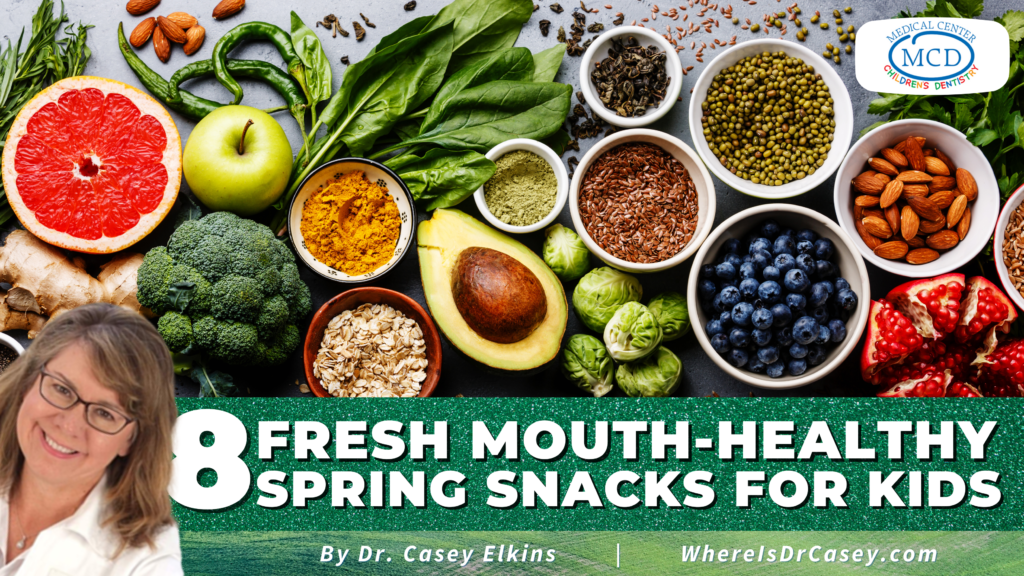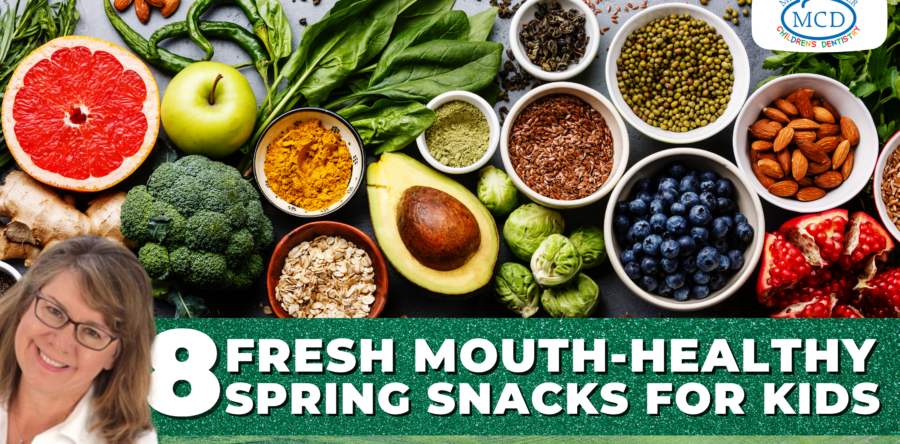
Spring is finally in the air! We are so excited, this is one of our favorite times of the year at Medical Center Children’s Dentistry. A lot of families have their kids home for spring break and others are just excited to get out in the warm weather on the weekends.
Dr. Casey believes in the importance that nutrition plays in our children’s lifelong oral health. This is why she thinks it’s important to share these tips and recipes with her patients' parents. Here are Dr. Casey‘s eight favorite springtime snacks your little one will love.
Spring Berries
Spring is a big season for our berry lovers! Most of our favorite berries, such as strawberries, blueberries, and blackberries are in season during the spring. These berries are locally in season in Central Texas from about April until about June. Berries are incredibly healthy snacks for kids (and adults), especially when it comes to oral health!
Strawberries are known to be one of the most popular and widely consumed berries today. These sweet and tart treats don’t just taste delicious, they also contain a lot of nutritional value too! They contain malic acid, a natural whitener of teeth. Strawberries are a very fibrous berry, which means they are great for both our children’s teeth and gums. They are packed with vitamin C.
Vitamin C is known for its antioxidant properties and its ability to aid in the growth and repair of tissues in all parts of the body. This is also true for our children’s mouths. Vitamin C is an important component used by our bodies in producing collagen! Collagen is a protein vital to maintaining your child’s gum strength. The collagen in the dentin of teeth depends on vitamin C for maintaining its strength and structure through synthesis.
Strawberries aren’t the only mouth healthy berries! Certain compounds within cranberries have been found to prevent some bacteria that lead to plaque and tooth decay. Blackberries are also rich in Vitamins A, C, folic acid, calcium, selenium, beta-carotene, and phytosterols which all help to maintain healthy our overall and oral health.
Cranberries, blueberries, strawberries, and raspberries are rich in anthocyanins, which may prevent harmful pathogens. The anthocyanins are also what give these berries such vibrant natural colors. Due to the fact that the rich colors of some berries can stain teeth, we recommend having your child brush shortly after eating a handful of berries, swish with water around helps too!
Peaches
Peaches are a southern staple! They are very popular in this part of Texas due to neighboring Fredricksburg’s vast peach orchids and their Peach Festival (July 9) as well! The taste of peaches is one reason we love them! Some people also appreciate that they are low in calories (100 g weighs in at just 39 calories). They also contain a whopping zero grams of saturated fats.
Yet, peaches are packed with countless health-promoting compounds, minerals, and vitamins that our bodies crave. Fresh peaches are known to be a good source of antioxidants and vitamin C! Remember, these are required for the building of connective tissue inside the human body. Consumption of foods that are rich in vitamin C is known to increase a person’s resistance to infections and even eliminate harmful free radicals that can cause certain cancers.
Peaches are a consistent source of vitamin A and beta-Carotene. Beta-Carotene is a pro-vitamin, which converts into vitamin A once inside our bodies. Consumption of fruits rich in vitamin A, such as peaches, has shown to offer protection from oral cancers, as well as others known carcinogens. They also contain a variety of vital minerals, including potassium, fluoride, and iron. Which also all have oral health benefits.
Peaches are also packed with potassium, known to aid in the regulation of heart rate and blood pressure. It even contains fluoride, which benefits your child’s bones and teeth through the prevention of dental caries (cavities). This beautifully colored, juicy fruit is one that children typically enjoy and is often introduced to children at a young age. Definitely a fan favorite for young kids!
Citrus fruits
It may be surprising to hear a dentist recommend citrus fruits in a mouth-healthy diet knowing that citric acid can harm teeth. The truth is that citrus fruits do still have oral health benefits, which is why we recommend them in moderation! Moderation is the key, as too much citric acid exposure can be harmful to our teeth.
Citrus fruits are extremely good for your oral health because they have a large amount of vitamin C. This vitamin is vital for our body’s day-to-day functions! In addition, the act of chewing these fiber-rich, fresh fruits actually massages the gums. This helps clean your child’s teeth and increases their salivation, which can neutralize the citric and malic acids that citrus fruits leave in their mouth.
While citrus fruits are a rich source of vitamin C, you need to be mindful of their high acidity. We recommend having your children brush or swish water shortly after enjoying their grapefruit or orange to prevent citric acid from lingering in their mouths. Most kids love oranges and they are a favorite among spring treats! Oranges and grapefruits are very common crops in south Texas, especially as you get closer to the valley. Many of the orchids will even let you pick your own citrus fruits by the bag, which is a fun family activity!
Plums
Plums are also a common fruit grown in Texas in the spring months! They are usually in season a little later in the spring, but well worth the wait. These juicy fruits are incredibly rich in fiber, water, and fluoride. They are also packed with nutrients such as vitamins K and C and potassium! All of these nutrients are known for an increase in bone density and minimizing bone loss. This includes our children’s teeth as well! They even promote healthy gums and fight bad breath.
Plums are a very rich source of important bioactive compounds such as phenolic acids, anthocyanins, carotenoids, flavanols, malic acid, citric acid, fiber, pectin, tannins, aromatic compounds, enzymes, various minerals like potassium, phosphorous, calcium, magnesium and vitamins A, B, C, and K. Just to name a few! All of these compounds and minerals play an active role in your family’s oral health!
If you or your children suffer from bleeding gums, one of the commonest dental problems, plums may help! The American Dental Association states that 7 out of 10 adults complain of bleeding gums while brushing their teeth. However, it can happen with children too. This can be due to factors such as plaque deposits, injury, or poor oral hygiene. Plums are a rich source of vitamin K which is important for certain clotting factors that aid in stopping bleeding gums. Plums have an excellent astringent property, which is also very useful in cases of bleeding gums.
Periodontal disease, also known as gum disease, is an inflammatory disease that is a result of a bacterial attack and the gum’s inflammatory response. Antioxidants are known to efficiently minimize the collagen breakdown caused by periodontal pathogens. It also helps in improving your child’s defense mechanism or immune response, which is vital to maintaining good, life-long periodontal and gum health. Foods rich in antioxidants, such as plums, not only help in cancer prevention but can even reduce the risk of developing many diseases associated with oxidative stress.
Plums are packed with Vitamin C, which keeps the connective tissue in the gums healthy! Essentially, they are what makes your child’s gums strong. Strong gums keep their teeth in place and prevent them from becoming loose and shaky when they are not supposed to be. The anti-oxidant property of vitamin C, also known as ascorbic acid, helps in wound healing and strengthening the teeth, bone, and cartilage. These are just a few of the reasons they are one of our go-to snacks.
Carrots
Supplying plenty of carrots to munch on is a great way to keep your children’s teeth healthy. While chewing foods that are crunchy and rich in fiber, their little mouth has to work a bit harder! These crunchy foods actually stimulate the gums and even saliva production. Maintaining their gum health is an important part of good oral health, so don’t hesitate to add some carrots to your child’s snack routine.
Raw carrots are a delicious, low-calorie food that has a rougher texture on the exterior. As children chew them and break them down, bits of carrot will brush against the surface of their teeth repeatedly. This lightly abrasive movement isn’t aggressive enough to damage their teeth. However, the action of chewing carrots is the perfect all-natural solution to destroying the bacteria and plaque building ups in their mouths.
Carrots are another food that contains beta-carotene, which we mentioned earlier, your body needs to create vitamin A. This fat-soluble vitamin is also essential to boost your child’s immune system and even assists in combatting the build-up of both plaque and tartar. It also benefits their oral health by fortifying their tooth enamel.
Another vitamin that carrots are rich in is vitamin K1. It plays an active role in strengthening their jawbones, as well as boosting their gum health. Having a life-long, balanced diet that includes foods rich in vitamin K is known to aid in preventing irregularities like TMJ disorders and periodontal diseases. The health and density of the bone in their jaw are crucial to holding their teeth correctly in place. The jaw bone holds the teeth’s sockets and roots, making them an incredibly important part of your child’s oral health. Functionality is also a vital part of jaw health, vitamin K aids in moving the upper and lower jaw bone in opposition to each other efficiently too.
Carrots also contain biotin, a vitamin that is ultimately responsible for converting food into energy and synthesizing your child’s fat and protein metabolism. This process benefits our body in many other ways as well, one of them being strengthening gum health. Clearly, carrots are crammed with countless nutrients making them a superfood perfect for any family’s snack time!
Leafy Greens
Leafy greens are a great way for families to ensure they are getting all of their nutrients in through delicious snack-sized salads. Spinach, arugula, lettuce, kale, chard, cabbage, and collard greens! These juicy and leafy greens are some of the best foods for your child’s teeth. We recommend serving it as they will eat it, plain or with a small drizzle of their favorite dressing.
All of the greens listed above are great choices for your child’s next healthy snack. Each of these leafy green vegetables is loaded with vitamins and minerals necessary to maintain and improve their oral health. They provide children with nutrients, such as folate, zinc, calcium, iron, magnesium, vitamin C, and fiber. These nutrients aid them in building strong bodies and immune systems capable of fighting disease. They also lower children’s future risks of heart disease and chronic inflammation later in life, as adults.
Dark leafy vegetables including spinach, kale, and lettuce contain high amounts of magnesium, vitamin A, vitamin C, beta carotene, calcium, and magnesium. Another nutrient found in these dark green foods is phosphorus, which benefits your child’s bone and tooth health. Phosphorus is naturally stored in your teeth and bones, it aids the body in balancing, then absorbing calcium and magnesium. Leafy greens each have their own health benefits based on their nutritional value. Finding a way to add these to your child’s diet is a great way to ensure they are eating a healthy balance of foods.
Broccoli
Not all children are fans of broccoli, in fact, many notoriously are not. Fresh broccoli not only offers a ton of vitamin C and vitamin K, which benefit bone health and ensure proper blood clotting but they are also known for their natural teeth cleaning abilities! When eaten raw, broccoli naturally breaks apart plaque that has built up on your child’s teeth, promoting their beautiful, healthy smile.
Broccoli doesn’t just clean and strengthens your child’s teeth though. It is also known for its natural ability to whiten teeth. Broccoli is filled with natural minerals that help boost the health and whiteness of teeth. Yet, it isn’t the only vegetable that whitens smilies, however, it is considered to be the healthiest teeth whitening vegetable with respect to its rich and varied assortment of vitamins, minerals, and nutritional benefits.
Broccoli is very low in calories when compared with other vegetables. This makes it a popular choice as a staple vegetable on the shopping lists of many Texas families. Broccoli is also rich in fiber, which is known to promote weight loss and aid in maintaining a healthy BMI. These facts are some of the reasons that broccoli has remained a steady part of the American diet over the decades. Maintaining a healthy lifestyle is an important part of your family maintaining good, lifelong oral and overall health.
Broccoli also contains sulforaphane, a mineral that has shown anti-cancer properties. It is very densely packed with vitamin C, much like many of the other delicious spring foods mentioned in this article! Vitamin C decreases the risk of periodontal disease and increases tissue strength. Kaempferol, a nutrient known as a flavonoid, is another key to broccoli’s ability to protect your child’s teeth from periodontal diseases. Broccoli also supplies a thick dose of beta-carotene, which we learned earlier improves vitamin A synthesis to improve teeth and gum health. It also contains nearly every vitamin B, including (but not limited to) B1, B2, B3, and B6! While still packing solid servings of iron, magnesium, potassium, and zinc as well.
Sweet Potatoes
These famous vegetables have anti-inflammatory benefits and support a healthy immune system, which highly impacts your child’s oral health. Sweet potatoes are known for being loaded with a healthy dose of vitamin A, which aids in maintaining your child’s mucous membranes and also helps to keep the soft tissue of their gums healthy. Vitamin A also promotes saliva production, a crucial component for cleaning away harmful bacteria and food particles stuck between your child’s teeth and gums.
Vitamin A also plays a vital role in maintaining the protein keratin, which promotes the formation of their tooth enamel. Some studies even indicate that keratin may prevent dental decay as well. While nothing can directly rebuild enamel, keratin can strengthen your child’s enamel setting them up for good, lifelong oral health.
The health benefits of yams don’t stop there! The potassium found in sweet potatoes aids in building bone mineral density. They are incredibly fibrous and are rich in antioxidants shown to protect the body from free radicals! These spuds have even been linked to lowering inflammation in the body and even preventing cancers. They contain healthy doses of both thiamine and niacin, which decrease the risk of tooth decay. Overall, these root veggies are great at regulating blood sugar, their anti-inflammatory properties can help prevent periodontal disease.
For this article, Dr. Casey purposely chose fresh produce that is local and currently in season for the spring! This means they should be readily available around central Texas and at their most affordable prices of the year. Making it the perfect time to add them to your family’s snack time selection! All of these snack options are optimally eaten raw, with the exception of sweet potatoes, which we recommend baking or air frying for the most nutritious results.
When we talk about the nutrition of our fresh produce, especially vegetables, certain methods of preparation and cooking limit our intake of certain nutrients. The best way to preserve the most nutrients is by steaming your vegetables. We have also found that children surprisingly do like steamed vegetables more than they are given credit for!
Raw produce will also offer the best nutritional value. As a parent, Dr. Casey understands that children do not always prefer raw produce as a snack. However, we also know how much kids love snacks, and how important snacks can be in maintaining a healthy nutritional balance at home. We also know from first-hand experience, that parents love snacks too! Keeping knees fresh, tasty foods around your house will keep everyone happy and healthy in the spring.
For more information about healthy nutrition for your child’s oral health, recipes, snack ideas, and more feel free to check out Dr. Casey's other articles. You are always welcome to reach out to our office as well!!!







3 Responses